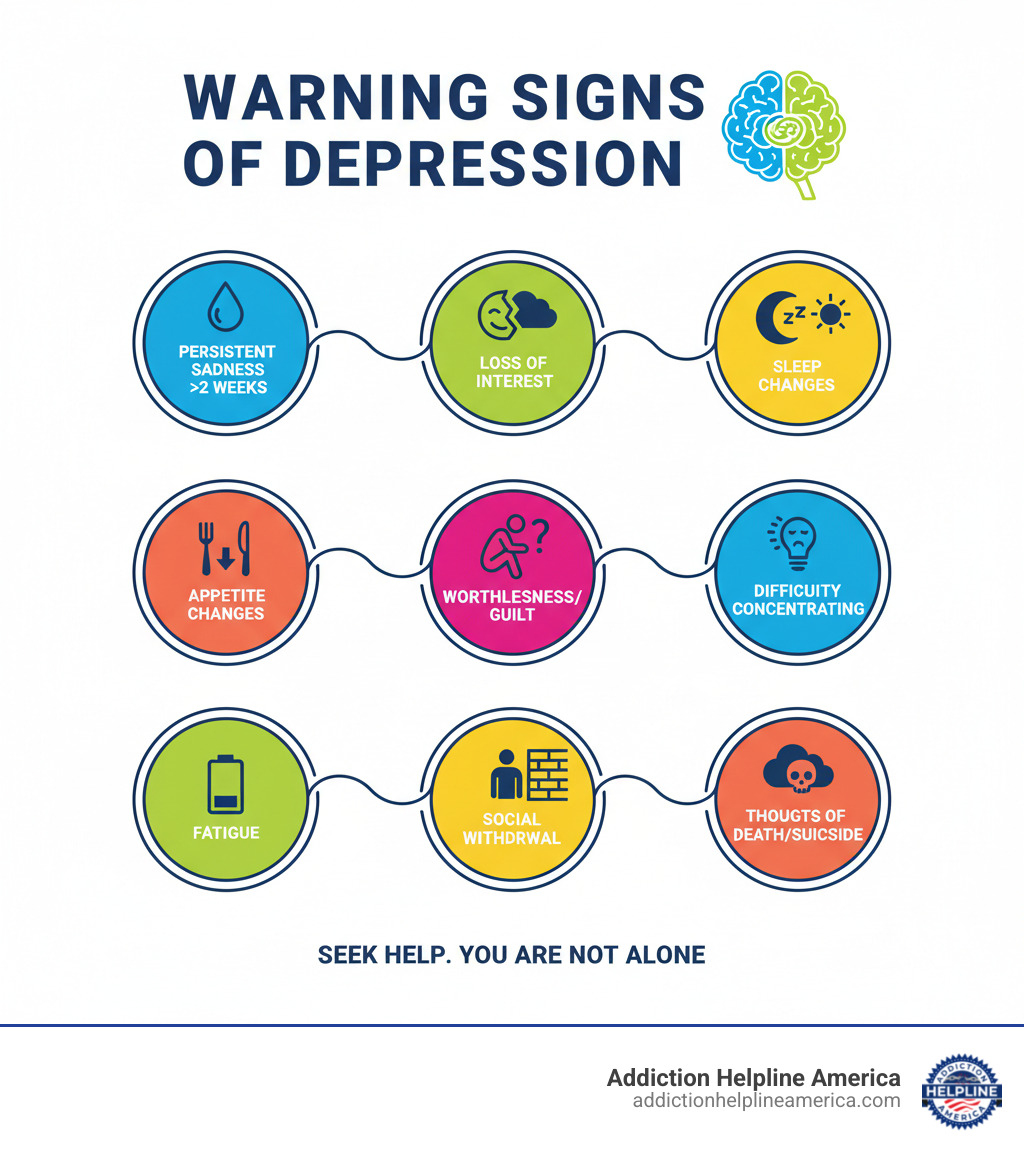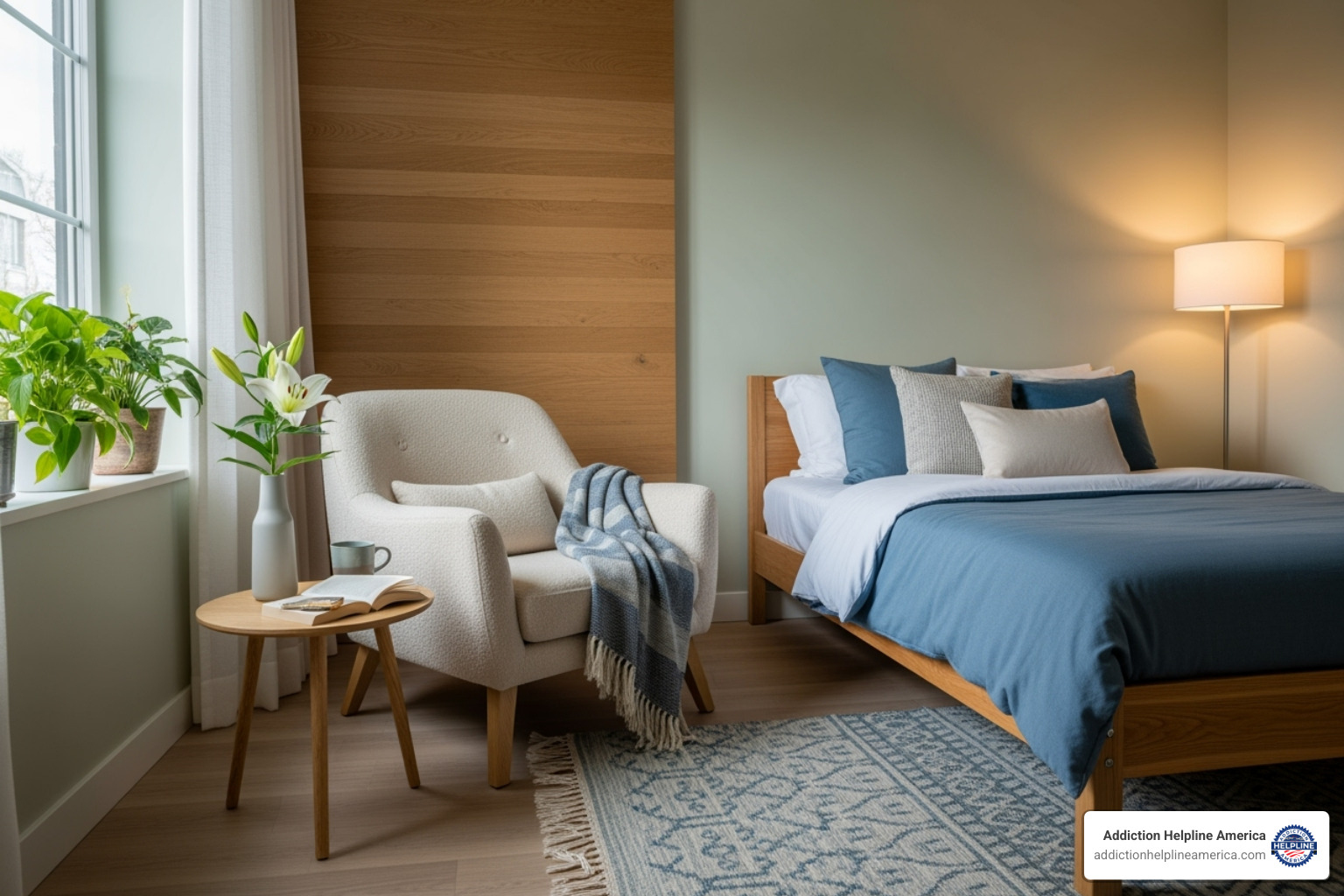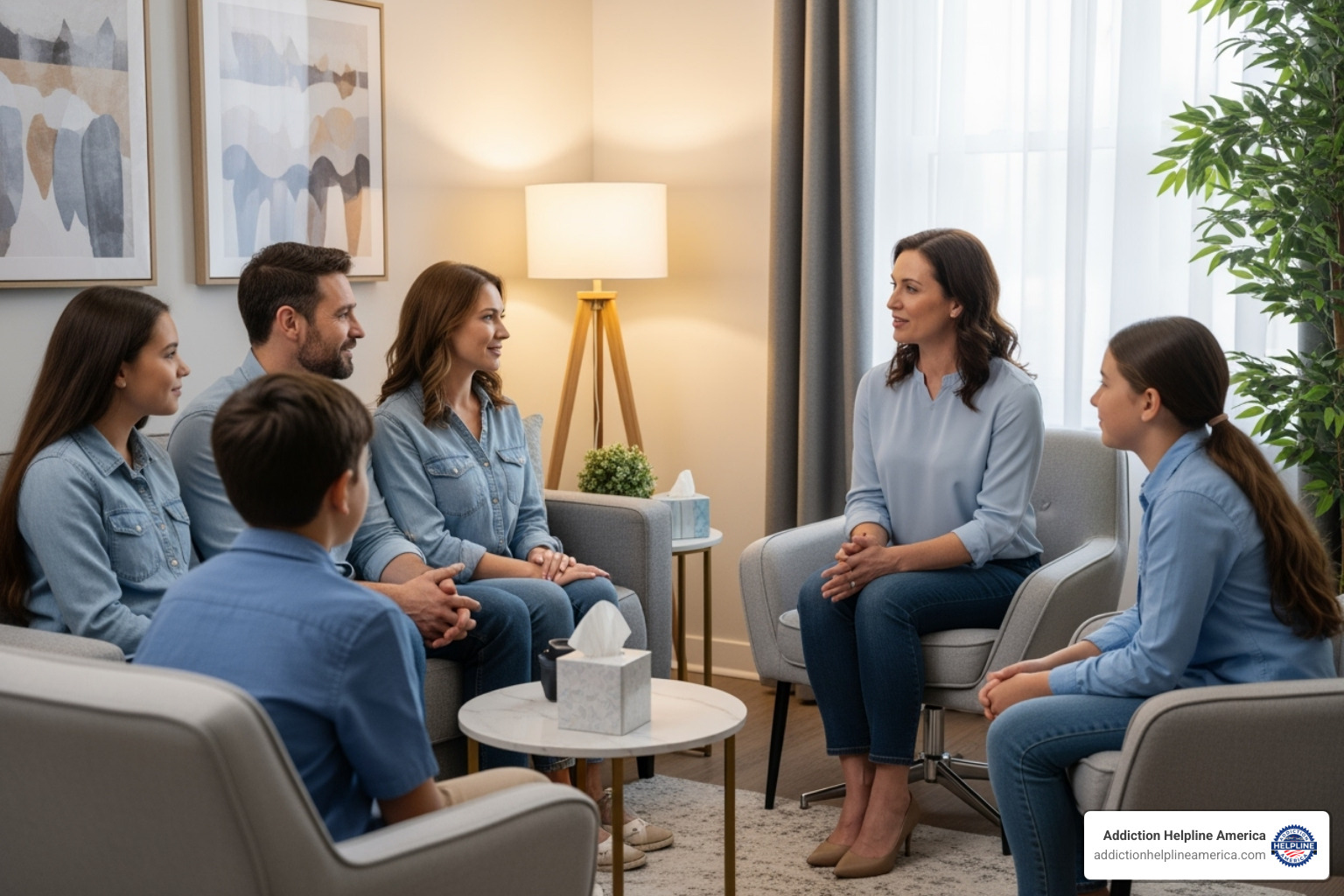
Understanding Depression Treatment: When Professional Help Becomes Essential
Rehabs for depression offer structured care when symptoms interfere with daily life. These centers combine therapy, medication management, and support to help people recover from this debilitating condition.
Quick Answer: Types of Depression Treatment Centers
- Inpatient/Residential: 24/7 care for severe depression or suicidal thoughts.
- Partial Hospitalization (PHP): Intensive day programs while living at home.
- Intensive Outpatient (IOP): Several hours of treatment per week with flexible scheduling.
- Outpatient Programs: Regular therapy for mild to moderate depression.
- Dual Diagnosis Centers: Treat depression alongside substance abuse.
Depression affects millions of American adults, but many do not receive treatment. When persistent sadness, loss of interest, or thoughts of self-harm make it impossible to function, professional intervention is crucial. The good news is that depression is highly treatable, even in severe forms. Finding the right program is the key to recovery.
At Addiction Helpline America, we help individuals and families steer mental health treatment, including specialized rehabs for depression. Our team understands that choosing the right program is the first step toward lasting recovery.
When Is It Time for Professional Depression Treatment?
Knowing when to seek professional help can be overwhelming, but recognizing the signs is life-saving. Clinical depression is a serious medical condition that requires expert care, especially when it starts taking over your daily life.
It’s time to reach out when you struggle with basic self-care, like getting out of bed or showering, and responsibilities begin to pile up.
If thoughts of self-harm or suicide enter your mind, seek immediate help. A doctor will typically recommend inpatient treatment for severe symptoms like chronic insomnia, hallucinations, an inability to care for oneself, or any thoughts of hurting yourself or others.
Rehabs for depression provide a safe, structured environment with round-the-clock support that you can’t get at home. When outpatient therapy isn’t enough, these programs offer intensive care from a team of specialists. You’ll have access to evidence-based treatments, medication management, and a support system designed for recovery. Most importantly, you won’t have to face this battle alone.
When to go to the hospital for mental health
Recognizing the Signs and Symptoms
Clinical depression is more than just sadness; it’s a persistent feeling of hopelessness lasting two weeks or longer that disrupts daily life. Key signs include a persistent low mood, overwhelming fatigue, and sleep problems like insomnia or oversleeping. Many people experience appetite changes, leading to weight loss or gain. Concentration issues can make work or school feel impossible, and social withdrawal leads to isolation. This is often accompanied by intense feelings of worthlessness or guilt. In teenagers, depression may manifest as anger, irritability, or a sudden drop in grades.
The Dangers of “Toughing It Out” Alone
Trying to “push through” depression is dangerous because it’s a medical condition that worsens without treatment. Untreated depression can lead to worsening symptoms, strained relationships, and declining work or school performance. Many people turn to alcohol or drugs to cope, creating a dangerous cycle of substance use that makes depression more severe. A professional diagnosis is crucial to rule out other medical issues and ensure you receive care that actually works. You deserve effective treatment, not guesswork.
Exploring Different Types of Depression Treatment Programs
No two people experience depression the same way, which is why a variety of treatment options exist. Rehabs for depression offer a spectrum of support, from 24/7 residential care to flexible outpatient programs, designed to meet you where you are.
At Addiction Helpline America, we know that finding the right level of care is a critical step toward healing. Treatment settings range from intensive, residential environments to flexible outpatient programs that work around your daily commitments. The goal is to find an option that can adapt as you progress in your recovery.
Levels of Care: From Inpatient to Outpatient
Understanding the different levels of care helps you find the right support for your recovery journey.
| Level of Care | Setting | Duration | Best For |
|---|---|---|---|
| Inpatient/Residential | 24/7 supervised care in a facility | 30-90+ days | Severe depression, suicidal thoughts, inability to function safely |
| Partial Hospitalization (PHP) | Day programs, sleep at home | 6-8 hours daily, 5-7 days/week | Need intensive therapy but can manage evenings at home |
| Intensive Outpatient (IOP) | Evening or day sessions | 3-4 hours, 3-5 days/week | Stepping down from higher care or need structure with flexibility |
| Standard Outpatient | Individual/group therapy | 1-2 hours weekly | Mild to moderate depression, maintenance phase |
Inpatient care offers the most intensive support with 24/7 supervision, ideal for severe depression or when outpatient methods have failed. Outpatient programs provide flexibility, allowing you to maintain daily responsibilities. Many people transition from a higher level of care to outpatient services in a process called “step-down care,” ensuring a smooth return to independent living.
Co-Occurring Disorders: Depression and Substance Use
Nearly half of people with depression also struggle with substance use. This is known as a “dual diagnosis.” Often, an attempt to self-medicate emotional pain with drugs or alcohol creates a vicious cycle: substances provide temporary relief but ultimately worsen depression. Breaking this cycle requires treating both conditions at the same time. Integrated treatment, which addresses both issues with a coordinated team, is the gold standard for dual diagnosis care and dramatically improves recovery outcomes.
More info about dual diagnosis services
Specialized Programs and Modern Approaches
Modern rehabs for depression offer specialized programs and innovative therapies. Adolescent programs address the unique ways teens experience depression, such as through anger or academic issues, and often include family therapy. Gender-specific programs create safe spaces for men and women to explore issues relevant to their experiences. Holistic therapies like yoga, art therapy, and equine (horse) therapy are used to treat the whole person by reconnecting the mind and body. Additionally, virtual and telehealth options have made quality care more accessible, offering effective therapy through video platforms.
Understanding Depression Treatment: When Professional Help Becomes Essential
Rehabs for depression offer specialized care when symptoms become severe enough to interfere with daily life. These treatment centers provide structured programs that combine therapy, medication management, and comprehensive support to help people reclaim their lives.
Quick Answer: Types of Depression Treatment Centers
- Inpatient/Residential: 24/7 care for severe depression, suicidal thoughts, or inability to function
- Partial Hospitalization (PHP): Day programs with intensive therapy while living at home
- Intensive Outpatient (IOP): Several hours of treatment per week with flexible scheduling
- Outpatient Programs: Regular therapy sessions for mild to moderate depression
- Dual Diagnosis Centers: Treat depression alongside substance abuse issues
Millions of American adults are affected by depression each year, yet only about half ever receive treatment. When someone experiences persistent sadness, loss of interest, or an inability to care for themselves, professional help is crucial. The good news is that depression is highly treatable, even in its most severe forms. Finding the right program can mean the difference between struggling alone and finding a path to recovery.
At Addiction Helpline America, we help individuals and families steer mental health treatment, including specialized rehabs for depression. Our experienced team knows that choosing the right treatment program is the first step toward lasting recovery.
When Is It Time for Professional Depression Treatment?
While everyone has difficult days, clinical depression is a serious medical condition that requires expert care, especially when symptoms start taking over your life. The decision to seek help from rehabs for depression often comes when you can no longer function day-to-day.
Struggling to get out of bed, neglecting self-care, or being unable to focus at work are not signs of weakness—they are red flags that you need professional support.
When depression becomes dangerous, immediate intervention is essential. If you are having thoughts of hurting yourself or others, experiencing hallucinations, or are completely unable to care for yourself, reach out for help right away. A doctor may recommend inpatient treatment for severe symptoms like chronic insomnia or suicidal thoughts.
Professional care offers a structured support system in a safe environment, away from daily stressors. Treatment centers provide a break from overwhelming responsibilities, plus access to a team of experts who understand what you’re going through. This includes a proper diagnosis, medication if needed, and learning effective coping strategies.
When to go to the hospital for mental health
Recognizing the Signs and Symptoms
Clinical depression involves a persistent feeling of sadness, emptiness, or hopelessness that lasts for at least two weeks and makes normal life feel impossible. A key sign is anhedonia, a complete loss of interest in things you once loved. Physical symptoms are also common, including constant exhaustion, sleep disturbances, and changes in appetite. Mental fog can make it difficult to concentrate or make decisions. The most serious warning signs are thoughts of self-harm or suicide, which require immediate professional attention. In teenagers, depression may appear as anger, irritability, or a sudden drop in school performance.
The Dangers of “Toughing It Out” Alone
Depression rarely improves without treatment and often gets worse. Untreated, symptoms typically become more severe, progressing from sadness to complete despair. Depression strains relationships, as it can make you irritable and withdrawn, causing you to isolate yourself from loved ones. Work and school performance suffer due to fatigue and concentration problems, which can lead to job loss or academic failure. To cope, up to a third of people with clinical depression turn to drugs or alcohol, which ultimately worsens the condition. Professional treatment breaks this downward spiral by providing a proper diagnosis, an individualized plan, and the structured support needed to heal.
Exploring Different Types of Depression Treatment Programs
Finding the right treatment can feel overwhelming, but the best rehabs for depression understand that no single approach works for everyone. They offer different levels of care to match your needs.
Depression treatment exists on a spectrum, from intensive residential programs to weekly therapy sessions. In between, there are several options that provide varying degrees of support and structure.
At Addiction Helpline America, we’ve guided thousands of families through these choices. Our team knows that finding the right program is about finding a place where you feel safe, understood, and hopeful about your recovery.
Levels of Care: From Inpatient to Outpatient
Understanding your options starts with knowing the different levels of care. Many people move through several levels as they recover.
- Inpatient or residential treatment provides the highest level of care with 24/7 support. It’s for those with suicidal thoughts or who are unable to manage basic needs. It offers a safe space to focus entirely on getting better.
- Partial hospitalization programs (PHP) offer intensive treatment during the day (6-8 hours) while you sleep at home. This works well if you need significant support but have a stable home environment.
- Intensive outpatient programs (IOP) are a step down, with treatment a few hours a day, 3-5 days a week. This level provides structure while allowing you to manage daily life.
- Standard outpatient treatment involves regular appointments with a therapist, often as a long-term way to maintain progress.
This flexible system allows you to transition smoothly between levels of care as you stabilize and grow stronger.
Co-Occurring Disorders: Depression and Substance Use
Depression often appears alongside other challenges, especially substance use. This combination is called a “dual diagnosis.” Up to a third of people with clinical depression also struggle with drugs or alcohol. Turning to substances for relief creates a vicious cycle: you use to numb the pain, but the substance makes the depression worse over time. The good news is that effective treatment addresses both issues together. Rehabs for depression that specialize in dual diagnosis understand that these conditions are connected and must be treated simultaneously for a successful recovery.
More info about dual diagnosis services
Specialized Programs and Modern Approaches
Today’s rehabs for depression offer specialized programs and innovative therapies that treat the whole person.
Age-specific programs recognize that teenagers and adults experience depression differently. Teen programs focus on age-appropriate therapies, while adult programs may address workplace stress or parenting challenges. Some centers also offer gender-specific programs.
Holistic therapies treat the mind, body, and spirit together. These can include yoga for stress reduction, art therapy to express difficult emotions, or equine therapy (working with horses) to build trust and self-esteem. Physical wellness, including exercise and nutrition, is also a vital part of recovery.
Virtual and telehealth options have made care more accessible, allowing you to receive therapy and psychiatric consultations from home. Research shows this can be just as effective as in-person treatment for many people.
How to Choose the Right Depression Treatment Center
Choosing the right rehab for depression is a critical decision. The quality and approach of the center will significantly impact your healing, so it’s important to research your options carefully.
When evaluating centers, look for proper accreditation and licensing, which ensure the facility meets standards for care and safety. The staff qualifications are equally important; seek out licensed professionals in psychology, psychiatry, counseling, and social work. Also, understand the center’s treatment philosophy. Do they use evidence-based practices and avoid a “cookie-cutter approach”? The best programs offer individualized care plans based on a comprehensive assessment, because your treatment should be as unique as you are.
What to Look for in a High-Quality Program
A high-quality program is built on several key pillars. The staff should consist of licensed professionals with extensive training and experience. A multidisciplinary team approach that includes psychiatrists, therapists, social workers, and nutritionists ensures all aspects of your well-being are addressed. Treatment should be rooted in evidence-based therapies like Cognitive Behavioral Therapy (CBT) and Dialectical Behavior Therapy (DBT). The program must create an individualized treatment plan after a thorough assessment. Finally, look for a center that prioritizes aftercare planning from day one and encourages family involvement to build a strong support system for your recovery.
The Role of Medication and a Multidisciplinary Team
For many people, medication plays a crucial role in treatment. A psychiatrist can perform an evaluation and prescribe antidepressants like SSRIs to help balance brain chemistry. Medication management involves careful monitoring to ensure the medication is working safely and effectively. However, medication is rarely a complete solution. The most effective rehabs for depression use a multidisciplinary team. Psychiatrists manage medication, therapists guide you through counseling, social workers assist with discharge planning, and nutritionists address dietary needs. This collaborative, holistic approach is designed to create lasting change.
Navigating Admissions, Insurance, and Costs
The admissions process typically begins with an initial assessment to understand your needs and create a personalized treatment plan. We know navigating the financial side can be stressful, but options are available.
Insurance verification is the first step. Many plans offer coverage for inpatient depression treatment. At Addiction Helpline America, our team provides free insurance verification to clarify your benefits and financial responsibilities. For services not fully covered, options like private pay, sliding scale fees based on income, or payment plans can make treatment more affordable.
Health insurance and mental health services
We believe financial barriers shouldn’t prevent anyone from getting help. Our role is to provide confidential guidance to help you find a program that fits your clinical needs and your budget.
The Recovery Journey: Family Support and Continuing Care
Recovery from depression is a journey that requires patience, commitment, and a strong support network. Completing an initial treatment program is a huge victory, but it’s just the beginning of building a hopeful life. The most successful recoveries happen when families are involved and a solid plan for continuing care is in place after leaving a rehab for depression.
How Loved Ones Can Provide Support
Family involvement is often essential for long-term success. The most helpful things loved ones can do include:
- Learning about depression: Understanding the illness makes it easier to offer empathy instead of frustration. They can’t just “snap out of it.”
- Creating a judgment-free environment: Listen without trying to fix everything. Avoid unhelpful phrases like “just think positive.” Simply being there is powerful.
- Participating in family therapy: These sessions are not about blame; they’re about improving communication and learning how to support recovery.
- Encouraging treatment: You can offer practical help, like driving them to appointments or reminding them about medication, in a supportive, non-controlling way.
- Practicing self-care: Supporting someone with depression is draining. Taking care of your own emotional well-being by seeking therapy or a support group is necessary.
The Importance of Continuing Care (Aftercare)
Finishing a program is not the end of the story. Continuing care, or aftercare, provides the ongoing support needed to maintain progress and build resilience. The best rehabs for depression begin discharge planning on day one, creating a roadmap for life after the program.
This plan often includes step-down programs for a gradual transition back to daily life, moving from inpatient to outpatient care. Support groups connect you with others who understand your experience. Many centers also offer alumni programs to keep you connected to a recovery community. Ongoing therapy helps you manage new challenges, while a relapse prevention plan gives you concrete tools for recognizing warning signs and taking action before a crisis occurs.
At Addiction Helpline America, we connect you with programs that provide excellent initial treatment and set you up for long-term success with comprehensive aftercare planning.
Frequently Asked Questions about Rehabs for Depression
It’s natural to have questions when considering treatment for depression. Here are answers to some of the most common concerns we hear at Addiction Helpline America.
How long does a stay in a depression treatment center typically last?
The length of stay is custom to your unique situation, the severity of your symptoms, and your progress. There is no one-size-fits-all answer.
- Inpatient/residential programs typically last 30 to 90 days, though longer stays may be needed for severe or co-occurring conditions.
- Partial hospitalization (PHP) and intensive outpatient (IOP) programs can last from several weeks to a few months, offering flexibility around work or school.
- Standard outpatient therapy is ongoing and can continue for as long as it is beneficial.
Your treatment team will work with you to determine the appropriate duration and when you are ready to transition to a different level of care.
What is the difference between a psychiatric hospital and a residential treatment center?
While both provide intensive support, they serve different purposes.
A psychiatric hospital focuses on crisis stabilization. It is for immediate danger, such as active suicidal thoughts or psychosis. The environment is clinical, and stays are typically short (a few days to a week) until the immediate crisis is resolved.
A residential treatment center, or rehab for depression, is designed for longer-term healing. The environment is more comfortable and home-like, allowing you to focus on recovery for several weeks or months. The goal is not just to stabilize symptoms but to address the underlying causes of depression through various therapies and build lasting coping skills.
Can I be forced to go to rehab for depression?
In certain rare circumstances, someone can be required to enter mental health treatment, but this is a last resort with strict legal protections.
Involuntary commitment laws, which vary by state, generally permit mandatory treatment only when a person is proven to be a danger to themselves or others, or is so disabled by their illness they cannot provide for their basic needs. This requires a formal legal process, often initiated by a family member or professional, and reviewed by a judge.
In an emergency, a temporary hold (often 72 hours) may be placed on someone who poses an immediate threat, allowing time for evaluation. The vast majority of people who enter rehabs for depression do so voluntarily. Seeking help willingly is always the best path.
Conclusion
Depression can feel like an impossible challenge, but recovery is possible. Rehabs for depression offer proven pathways to healing, no matter how dark things seem.
The journey begins with recognizing that symptoms of depression are not character flaws—they are signs of a treatable medical condition. When depression makes it impossible to function, professional help is essential.
We’ve seen that various levels of care are available, from inpatient treatment for crises to flexible outpatient programs. Specialized dual diagnosis programs can treat depression and substance use simultaneously, breaking a cycle that traps so many.
The right treatment center uses evidence-based therapies, a multidisciplinary team, and an individualized plan. They involve family and prepare you for long-term success with comprehensive aftercare planning. Recovery is an ongoing journey supported by continuing care and a strong support system.
If you are wondering if it’s time to seek help, trust that voice. Depression is one of the most treatable mental health conditions. You don’t have to figure this out alone.
At Addiction Helpline America, we offer free, confidential, personalized guidance to help you find a program that fits your needs. Our experienced team has connected thousands with the right rehabs for depression, and we’re here for you too.
Recovery is possible. Are you ready to take the first step?
Our helpline is 100%
free & confidential
If you or someone you care about is struggling with drug or alcohol addiction, we can help you explore your recovery options. Don’t face this challenge alone—seek support from us.
Programs
Resources
Will my insurance
cover addiction
treatment?
We're ready to help
Find the best
drug or alcohol treatment
center
Are you or a loved one struggling with addiction? Call today to speak to a treatment expert.

















